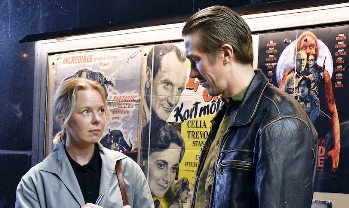 Aki Kaurismäki continues his devotion to stories about lonely people looking for connection in this low-key drama about two working class people who almost don’t get together.
Aki Kaurismäki continues his devotion to stories about lonely people looking for connection in this low-key drama about two working class people who almost don’t get together.
Aki Kaurismäki has made 20 feature films in 42 years, plus about a dozen shorts, parts of anthologies, and music videos. With apologies to all the other filmmakers in Finland, he is clearly the most important Finnish director as well as the only one widely known outside of his country. His movies mostly deal with the lives of working class people, their feelings and their struggles, and his style usually displays a reserved, deadpan, almost grim sense of humor. His latest is called Fallen Leaves, and as you would expect, its theme of finding love later in life is autumnal in style and tone.
Ansa, a woman in her 40s played by Alma Pöysti, works in a Helsinki supermarket. She is quiet and lives alone with few friends, but she has a heart, and gets fired for giving expired food to a homeless person. Later she gets a job doing menial work at a recycling center. One night at a karaoke bar, she sees a man amusingly singing off-key. It’s not this man that catches her eye, but his friend, Holappa, a shy middle-aged factory worker played by Jussi Vatanen. Later he sees her again and asks her out. They go to a movie, which happens to be Jim Jarmusch’s zombie comedy The Dead Don’t Die, after which she gives him her number. Unfortunately, the hapless fellow immediately loses the paper that has her number on it, and (wouldn’t you know?) even neglects to get her name. Definitely interested, he wanders around, hangs out at the karaoke bar hoping to see her again, and eventually goes back to the movie theater where they had last spoken.
This little plot device of losing contact, followed by the anxiety of trying to find her, is in line with the film’s mild sad sack form of comedy. The objective world is a constant obstacle to the fulfillment of even the characters’ most modest desires, which is part of Kaurismäki’s critical vantage point on society. The daily routines of working people; the shabby, depressing feel of the less affluent parts of a city, with its dreary buildings and streets; these are accentuated by Kaurismäki’s retro sensibility. The story takes place in 2022, but the vehicles, appliances, and other small details look more like the 1980s or ‘90s. These characters seem to have fallen behind the rest of the world, but at the same time there is the feeling of an impending threat—whenever a character turns on a radio, the news is about the Russian invasion of Ukraine. In this cocoon of isolation, the menace of world events still casts a shadow.
Booze is another factor in working class life that Kaurismäki has not neglected exploring in his films. In this one, Holappa secretly carries a bottle wherever he goes, and we see him fortifying himself with it when he’s under stress. He and Ansa do manage to meet up again. His drinking, however, poses a problem. Ansa has seen family members, including her father, destroyed by alcoholism, and she’s decided never to get involved with a drunk.
Throughout the picture, the dreary conditions of life for these characters, and the subdued color photography and plain set design, contrast with the soundtrack’s sentimental pop songs to create a consistently droll effect. We even get a bit of Tchaikovsky’s hyper-romantic Sixth Symphony in the mix. The effect is oddly joyful—a weird sort of affirmation. It’s as if Kaurismäki set out to make the purest Kaurismäki film, without embellishments. Fallen Leaves demonstrates his delight in the possibility of love in the midst of discouraging times.

An amazing simulated documentary celebrates the world of neighborhood bars: the situation is invented, but the people are real. If you’ve ever gone to...

I’ve long been interested in Russian film, including films from the Soviet era. But I’ve only recently begun to explore the work of one...

Lucrecia Martel’s latest film is a portrait of colonial futility, in which an 18th century official in an out-of-the-way South American locality struggles to...